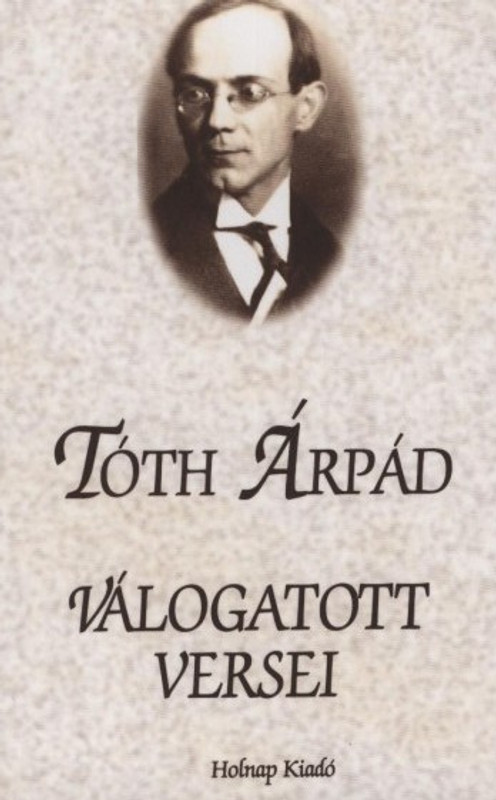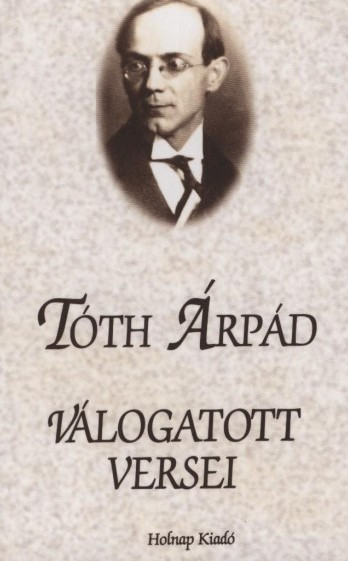Description
Tóth Árpád válogatott versei: Master of the Hungarian Melancholy Song / Hardcover
UPC: 9789633465516
MPN: 9789633465516
Brand Name: Holnap Kiadó
Overview
Tóth Árpád válogatott versei (Selected Poems of Árpád Tóth) is an essential collection from one of early 20th-century Hungary's most distinctive poetic voices, published in 2002 by Holnap Kiadó as part of their distinguished Válogatott Versek (Selected Poems) series. This 214-page hardcover presents the finest works of a poet whom his friend, novelist Jenő Tersánszky, characterized as "the greatest master of the Hungarian melancholy song"—a peculiar compound phrase referring to the elegiac genre's dominance in his work. Árpád Tóth (1886-1928) belonged to the first generation of the legendary literary journal Nyugat (West), and though he published only four volumes of poetry during his lifetime, his contribution to Hungarian literature was immense. Tóth played masterfully on the strings of spleen, resignation, skepticism, and pain, often "writing backwards from the rhymes"—starting with perfect rhyme schemes and building poems around them—sometimes immersing himself in the centuries-old formal traditions of elegy, other times tempestuously breaking through and capriciously renewing those traditions. His era and fate provided ample subject matter for singing of lost hope: illness, existential struggles, World War I—all gave philosophical grounding to the intellectual-emotional sorrow that permeates his poems. This collection offers readers access to one of Hungarian modernism's most melancholic yet formally brilliant voices.
Product Features
- Format: Hardcover book (fűzött kemény papír)
- Pages: 214 pages
- Language: Hungarian (Magyar)
- Dimensions: 120mm x 190mm (4.7" x 7.5")
- ISBN: 9789633465516 / 978-9789633465516
- Publisher: Holnap Kiadó
- Publication Year: 2002
- Publication Location: Budapest, Hungary
- Poet: Tóth Árpád (1886-1928)
- Series: Válogatott Versek sorozat (Selected Poems Series)
- Literary Movement: Nyugat first generation
- Genre: Elegiac poetry, Melancholic verse, Modernist poetry
- Published Volumes: Selection from four original poetry collections
- Themes: Melancholy, resignation, skepticism, suffering, illness, war, existential sorrow
- Style: Masterful formal technique, "backwards writing" from rhymes, innovative elegy
- Historical Context: World War I era, early Hungarian modernism
Interesting Facts
Árpád Tóth (1886-1928) was one of the most technically accomplished and emotionally profound poets of early 20th-century Hungary. Born in Arad (now in Romania), Tóth studied at Budapest University and became associated with the groundbreaking literary journal Nyugat (West), which revolutionized Hungarian literature by introducing modernist European influences while developing distinctively Hungarian forms. Despite publishing only four slim volumes—Hajnali szerenád (Dawn Serenade, 1913), A míly kút (The Deep Well, 1918), Esti kérdés (Evening Question, 1920), and Körúti hajnal (Boulevard Dawn, 1923)—Tóth earned recognition as a master craftsman and one of the finest elegiac poets in Hungarian literature. His friend Jenő Tersánszky's description of him as "the greatest master of the Hungarian melancholy song" captures both his thematic focus and his technical brilliance. Tóth suffered throughout his life from tuberculosis, which eventually claimed his life at age 42, and this constant proximity to death infuses his poetry with authentic awareness of fragility and mortality. His existential struggles—poverty, illness, the trauma of World War I—were not merely biographical facts but became the philosophical foundations for his intellectually rigorous explorations of sorrow, doubt, and resignation. Tóth's technical innovation was remarkable: he often composed "backwards," beginning with perfect rhyme schemes and constructing entire poems to fit those musical patterns, demonstrating that formal constraint could enhance rather than limit poetic expression. His elegies both honor centuries-old traditions and radically renew them, creating a distinctive voice that is simultaneously classical and modern. Beyond his original poetry, Tóth was one of Hungary's greatest literary translators, bringing works by Baudelaire, Verlaine, Oscar Wilde, Swinburne, and other European poets into Hungarian with exceptional sensitivity and technical skill. His translations helped introduce Hungarian readers to French Symbolism and English Aestheticism. Tóth's influence on Hungarian poetry extends beyond his own work—his demonstrations of formal mastery influenced generations of poets who followed, showing that traditional forms could express thoroughly modern consciousness. His poetry embodies what might be called "aristocratic melancholy"—sorrow expressed not through raw emotion but through refined artistry, intellectual depth, and musical perfection. This 2002 selected poems volume allows contemporary readers to encounter a poet who transformed personal suffering into art of enduring beauty and philosophical significance.
Publisher Information
Holnap Kiadó is a prestigious Hungarian publishing house based in Budapest, established in 1918—the same year Nyugat reached its height of influence. The publisher's Válogatott Versek series demonstrates their commitment to preserving the legacy of Hungary's greatest poets, including figures like Árpád Tóth who, despite brief careers, made lasting contributions to Hungarian literary culture. This 2002 edition ensures that Tóth's masterful elegies remain accessible to readers seeking poetry of technical brilliance and emotional depth.
We value your feedback! Share your experience with this product to help others make informed decisions. Your review is important to us!
#TóthÁrpád #ÁrpádTóth #HungarianPoetry #MagyarKöltészet #ElegiacPoetry #ElégiáiKöltészet #VálogatottVersek #SelectedPoems #HolnapKiadó #Nyugat #NyugatGeneration #HungarianLiterature #MagyarIrodalom #MelancholicPoetry #SzomorúdalKöltészet #ModernistPoetry #ModernizmusKöltészet #20thCenturyPoetry #WWIPoetry #VilágháborúsKöltészet #FormalMastery #FormaVirtuozitás #HungarianElegy #MagyarElégia #LiteraryTranslator #IrodalmiFordító #HungarianBooks #BudapestPublishing
Tóth Árpád válogatott versei: A magyar szomorúdal mestere
Áttekintés
A Tóth Árpád válogatott versei nélkülözhetetlen gyűjtemény a 20. század eleji Magyarország egyik legkülönlegesebb költői hangjától, amelyet 2002-ben adott ki a Holnap Kiadó a kiváló Válogatott Versek sorozat részeként. Ez a 214 oldalas keménykötésű kötet egy olyan költő legszebb műveit mutatja be, akit barátja, Tersánszky J. Jenő "a magyar szomorú-ének legnagyobb művésének" jellemzett—különös összetett szóval utalva az elégia műfajának uralkodó voltára munkásságában. Tóth Árpád (1886-1928) a legendás Nyugat folyóirat első nemzedékéhez tartozott, és bár életében csupán négy verseskötetet publikált, hozzájárulása a magyar irodalomhoz hatalmas volt. Tóth mesterileg játszott a spleen, rezignáció, szkepszis és fájdalom húrjain, gyakran "visszaírva a rímek felől" a sorokat—tökéletes rímképletekkel kezdve és köréjük építve a verseket—hol belemerülve az elégia évszázados formahagyományába, hol viharosan áttörve és szeszélyesen megújítva azt. Kora és sorsa bőséges tárgyat nyújtott a reményvesztés kiéneklésének: betegség, egzisztenciális gondok, az első világháború—mind filozófiai alapot adtak verseinek intellektuális-emocionális bánatához. Ez a gyűjtemény hozzáférést kínál a magyar modernizmus egyik legmelankólikusabb, mégis formailag legkiválóbb hangjához.
Érdekes tények
Tóth Árpád (1886-1928) a 20. század eleji Magyarország egyik legtechnikailag képzettebb és érzelmileg legmélyebb költője volt. Az Aradon (ma Romániában) született Tóth a budapesti egyetemen tanult, és kapcsolatba került az úttörő Nyugat folyóirattal, amely forradalmasította a magyar irodalmat modernista európai hatások bevezetésével, miközben jellegzetesen magyar formákat fejlesztett ki. Annak ellenére, hogy csupán négy vékony kötetet publikált—Hajnali szerenád (1913), A míly kút (1918), Esti kérdés (1920) és Körúti hajnal (1923)—Tóth elismerést szerzett mint mester-kézműves és a magyar irodalom egyik legkiválóbb elégiakusa. Barátja, Tersánszky J. Jenő leírása róla, mint "a magyar szomorú-ének legnagyobb művésze" megragadja tematikus fókuszát és technikai zseniálisságát egyaránt. Tóth egész életében tuberkulózisban szenvedett, amely végül 42 éves korában elvitte, és ez az állandó közelség a halálhoz áthatja költészetét a törékenység és halandóság hiteles tudatosságával. Eredeti költészetén túl Tóth Magyarország egyik legnagyobb irodalmi fordítója volt, Baudelaire, Verlaine, Oscar Wilde, Swinburne és más európai költők műveit ültetve át magyarra kivételes érzékenységgel és technikai tudással.
Hashtag-ek magyar nyelven:
#TóthÁrpád #MagyarKöltészet #ElégiáiKöltészet #VálogatottVersek #HolnapKiadó #Nyugat #NyugatNemzedék #MagyarIrodalom #MelankóliásKöltészet #SzomorúdalKöltészet #ModernizmusKöltészet #20SzázadiKöltészet #VilágháborúsKöltészet #FormaVirtuozitás #MagyarElégia #IrodalmiMester #IrodalmiÖrökség #MagyarKönyvek #BudapestiKiadó









